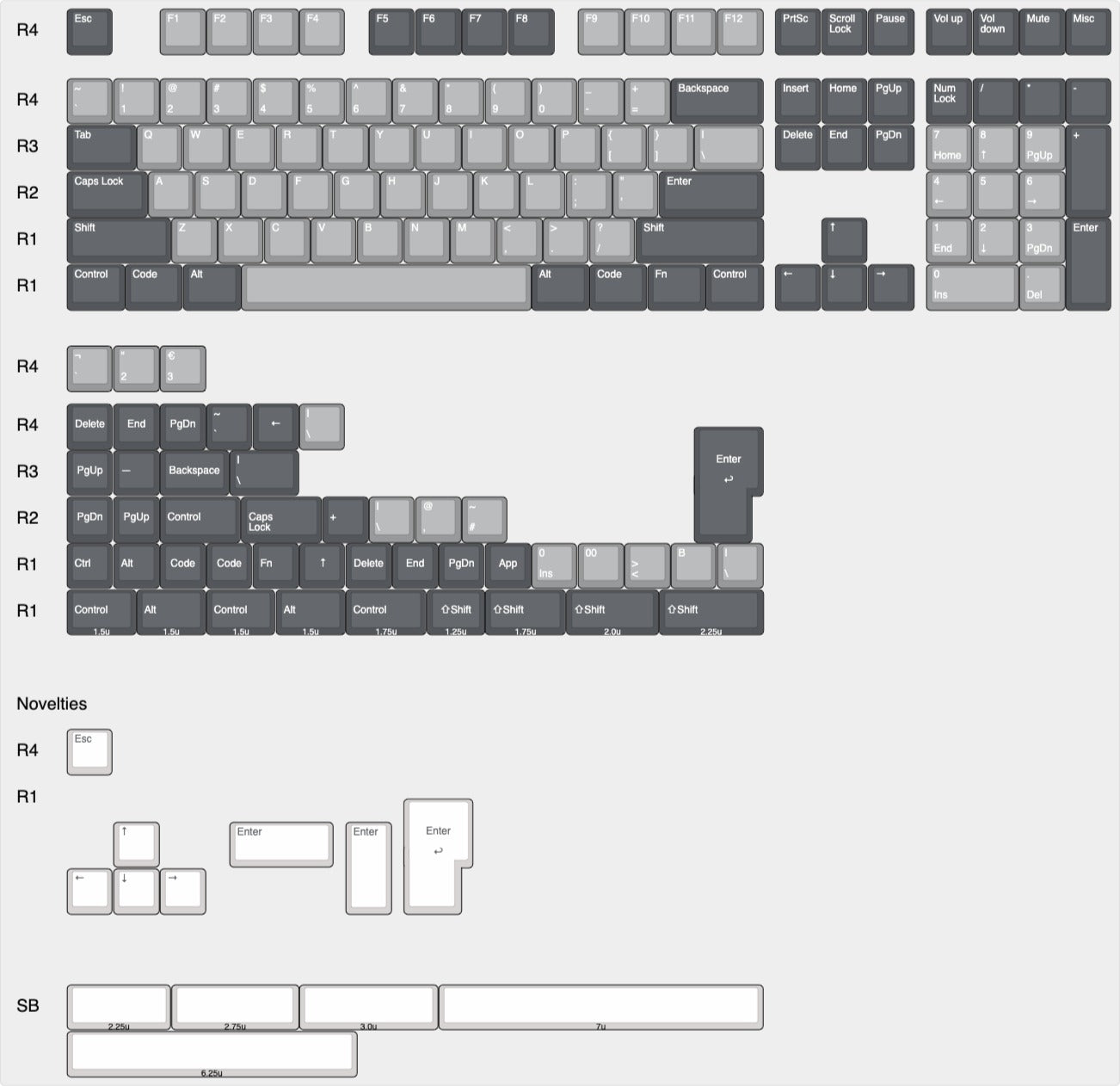If you rock a white/silver/black board and wanted to go in the direction of the monochrome theme, then the new Kinetic Labs Seal PBT keycaps could very well be a set to consider. Seal PBT are double-shot keycaps, like the Whale and Octopus, but as they use a different mould during manufacturing, the results are actually quite different. Still, the Seal PBT retails for US$65, and will be an in-stock item.
Tech specs
| Manufacturer | PolyCaps |
| Material | PBT |
| PBT feel | Textured |
| Legends | Double-shot |
| Profile | Cherry |
| Compatibility | ANSI support for 60%, 65%, 75%, and 100% (full size), including WKL. Support for conventional Alice, split shifts, ISO. No dedicated support for 40% or ortho. |
Unboxing
Kinetic Labs Seal PBT keycaps comes in smaller box than the Whale, but still features an art styled box that features a Seal graphic. In the box you’ll find 3 trays of keycaps. No keycap puller.



Keyboard layout support
Like all Kinetic Labs keycaps, the Seal PBT only has one option of an “all-in-one” kit, which will fit conventional keyboard layouts (60%-100%) that use a standard bottom row. Seal PBT now supports ISO layouts, which previously the Whale PBT do not. This is welcomed update while keeping the prices the same. You can refer to the below image made by Kinetic Labs to check if this keycap set is compatible with your current keyboard.

Keycaps quality and legends
The keycaps of Seal PBT as the name suggests are made from PBT plastic, which takes way longer to shine compared to ABS plastic. You can also expect the PBT plastic have some grain-like texture to it, which I personally find to be satisfying to type on. In fact, the texture of the Seal PBT is more defined than on the Whale PBT. It feels slightly “rougher” and I like it, but unfortunately I can’t capture a close-up shot that can show it in picture.

Quality of the plastic is improved over the Whale PBT. Previously I found that that the Whale PBT was slightly prone to scuff marks from keycap pullers. On the Seal PBT, the keycaps are slightly thicker and are more resilient to the force from keycap pullers.


As seen above, the legends on the alphabets are also different when compared to the Whale PBT. The legends are thicker and still remain as crisp. Personally, I like the thicker legends. However, the legends on the modifiers are a different story. First thing to note is that modifiers on Seal PBT utilises a “Icon+Text” style, which to me looks better than the “Text” style on the Whale. But the improvement kinda stops there.


Compared to the Whale PBT, the modifiers on the Seal PBT are more scuffed with letters being printed unevenly in terms of spacing and thickness. It is really a shame as the alphas gave the impression of an improved set over the Whale.

Another thing to note is that the Seal PBT set is that the 7u spacebar (typically used for WKL layout), only comes in the accent colour of white and not the alpha colour of light grey. It would have to nice to see Kinetic Labs also included a 7u spacebar in grey as not everyone is a fan of an accented spacebar.
Colourway & mounted on keyboards
On first look, the colourway of the Seal PBT does look very similar to GMK Apollo, but having seen the keycaps in person, the alphas on the Seal PBT is definitely towards a more lighter grey. Personally, I find the monochrome style of colours on the Seal PBT to look best on light coloured boards.

I mounted the Seal PBT on my Babypowder White OwLab Mr. Suit and they blend really nicely with the overall clean look of the white board. Depending on how the light hits the keycaps, the alphas can tend to look lighter on some pictures and darker on others.




Where to buy
As of now, you can only purchase the Kinetic Labs Seal PBT keycaps directly from Kinetic Labs. The retail for US$65 which is a pretty good price but shipping out of US on their site is typically expensive. If you’re interested, I’d recommend collating orders in order to split the shipping cost. Alternatively, you can try using freight forwarding services such as EzShip to reduce the shipping cost.














Leave a Reply